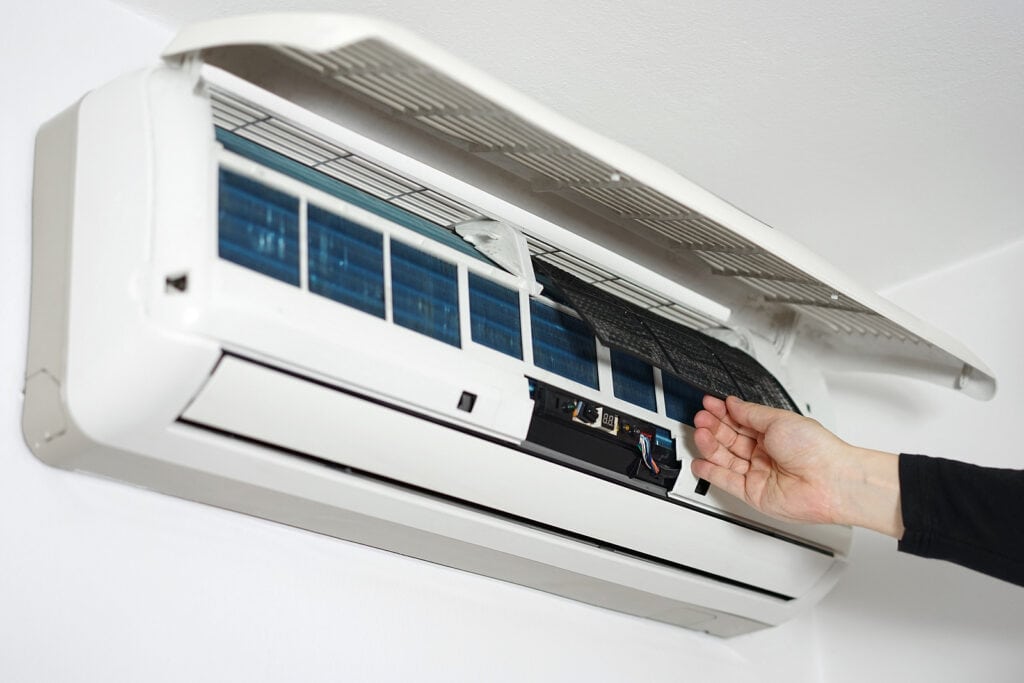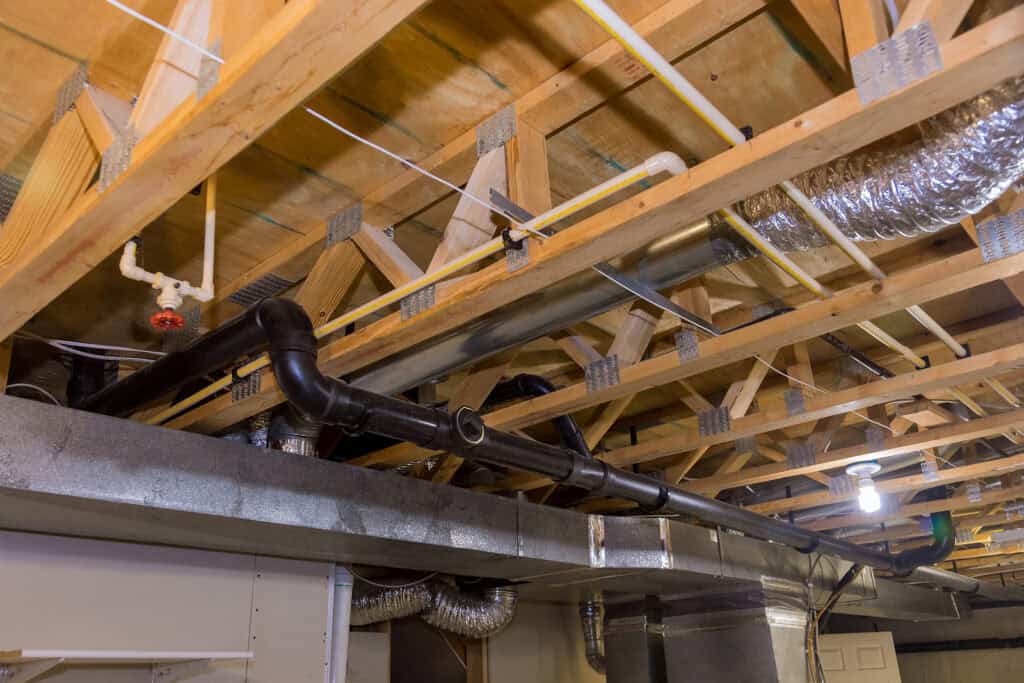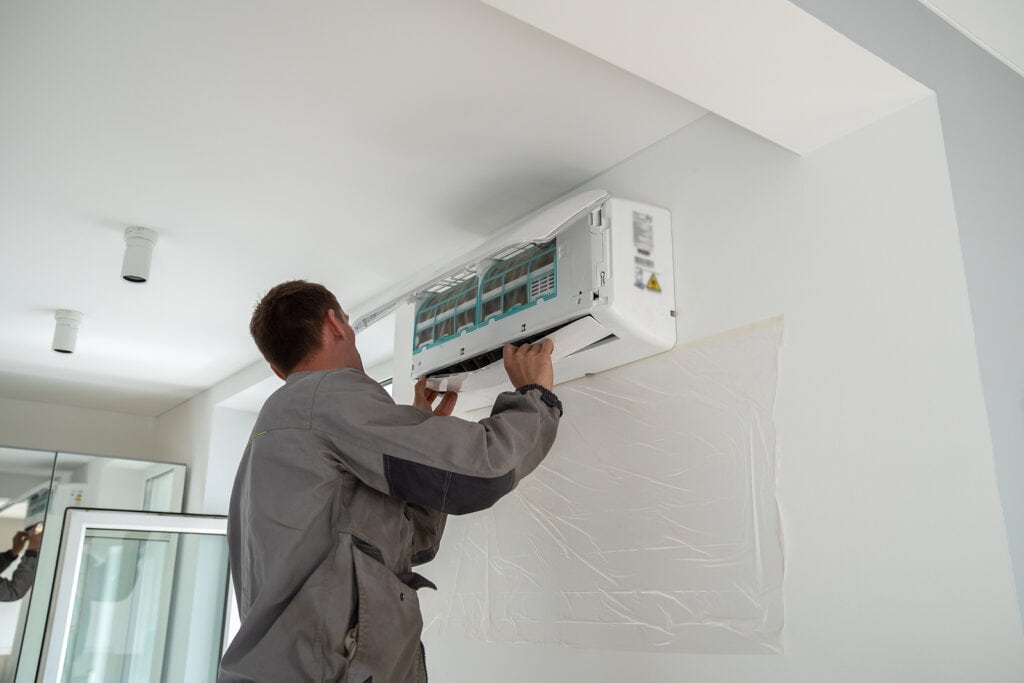Now that the weather is heating up, homeowners are getting ready to keep their living spaces comfortably cool. Whether you’re considering upgrading your existing air conditioning system or exploring new options, it’s best to weigh the pros and cons of different HVAC & AC systems.
A question homeowners should ask themselves is which system is right for their home. Is it worth investing in ductless systems? Do you have just one small room in need of cooling? These are things to consider while shopping around.
Below are the advantages and disadvantages of each air conditioning system.
Most Common Air Conditioner Systems
Homeowners have multiple options for cooling their homes, with the most common choices being central air conditioning, ductless mini-split systems, and window air conditioners. Each of these methods offers its own set of benefits as well as downsides.

Benefits and Limitations of Window Air Conditioners
A classic choice for cooling your home, window units are favored by apartment renters and those with smaller spaces, as they provide cost-effective cooling solutions.
Advantages of Window Units
- Portability: AC window units are relatively easy to move around the house and can be relocated from one location to another within minutes.
- Ease of installation: Sometimes window units require two people when it comes to placing the unit securely on the awning but other than that – an extension cord, screws, and an outlet is typically all that is needed.
- Affordability: They require minimal space to install and are ideal for cooling individual rooms without breaking the bank.
Disadvantages of Window Units
- Noise pollution: Over time, the fan motor of window units may become loud, causing disturbances, particularly during the night when people are attempting to sleep.
- Cooling coverage: One window unit won’t cool an entire house. These units are designed to cool smaller areas, such as a student dorm room.
- Security concerns: Placing a window air conditioner in first floor windows can pose a security risk, as theft has been a common occurrence.
- Unappealing: For those concerned about the aesthetics of their homes, the sight of a window unit hanging over their garden or patio space may be unattractive.
Pros and Cons of Central Air Conditioners
Central air conditioning systems are a popular choice among homeowners, offering numerous advantages. However, like any other option, they also come with certain disadvantages:
Pros of Centralized Air Conditioning
- Expanded cooling: Centralized air conditioning typically cools an entire house, eliminating the chances of warm areas in the house.
- Improved comfort: Central air conditioning is an excellent choice for homeowners who prefer consistent temperatures throughout their home.
- Reduced noise: Besides the occasional noise from the condenser unit outdoors, central air conditioning is known to be quiet.
- Improved air quality: Air filtration systems help reduce allergens like dander, promoting better indoor air quality and ensuring comfort for allergy-sensitive residents.
Cons of Centralized Air Conditioning
- Cost of Installation: The upfront payment for centralized air conditioning can be expensive due to ductwork and unit installation fees.
- Maintenance & care: Centralized air requires annual maintenance, which can become costly if diagnostics are needed.
- Space requirements: Houses with limited space may face challenges with installing centralized air conditioning units.
- Ductwork installation: In order for centralized air conditioning to work, ductwork is required throughout the home. Issues with ductwork can become costly and result in poor performance from the unit.

Advantages and Disadvantages of Ductless Mini-Split Systems
Homeowners who are looking for cooling with a customizable advantage may turn to ductless mini-split systems.
Advantages of Ductless Mini-Split Systems
- Energy efficient: Since ductless systems have the ability to cool rooms by choice, this helps reduce the use of energy put out by the air conditioner. It also eliminates ductwork, which eliminates the chances of leaks over time.
- Individualized temperature control: Ductless systems empower homeowners to customize the cooling of each room according to their preferences, ensuring personalized comfort levels and minimizing energy wastage.
- Noise reduction: There is little sound when it comes to running mini-split systems in your home.
- Installation Ease: When conducted by an HVAC professional, ductless mini-split systems can be installed and operational within a single day. The elimination of ductwork contributes to reduced work in the home.

Disadvantages of Ductless Mini-Split Systems
- Initial Price: Ductless mini-split systems can be costly up-front compared to window units and centralized air conditioning.
- Appearance: Similar to window units, ductless mini-split systems are noticeable both inside and outside your house. Unlike centralized air systems, some homeowners may find the visible indoor and outdoor units less pleasing, particularly if placed in prominent areas of the house.
Choosing the Right Air Conditioner for Your Needs
We hope our guide helps you understand which way is best to cool your home, whether it’s a quick fix or forever home investment, our team of HVAC professionals are here to help you. Contact our team today to improve your air conditioning.




